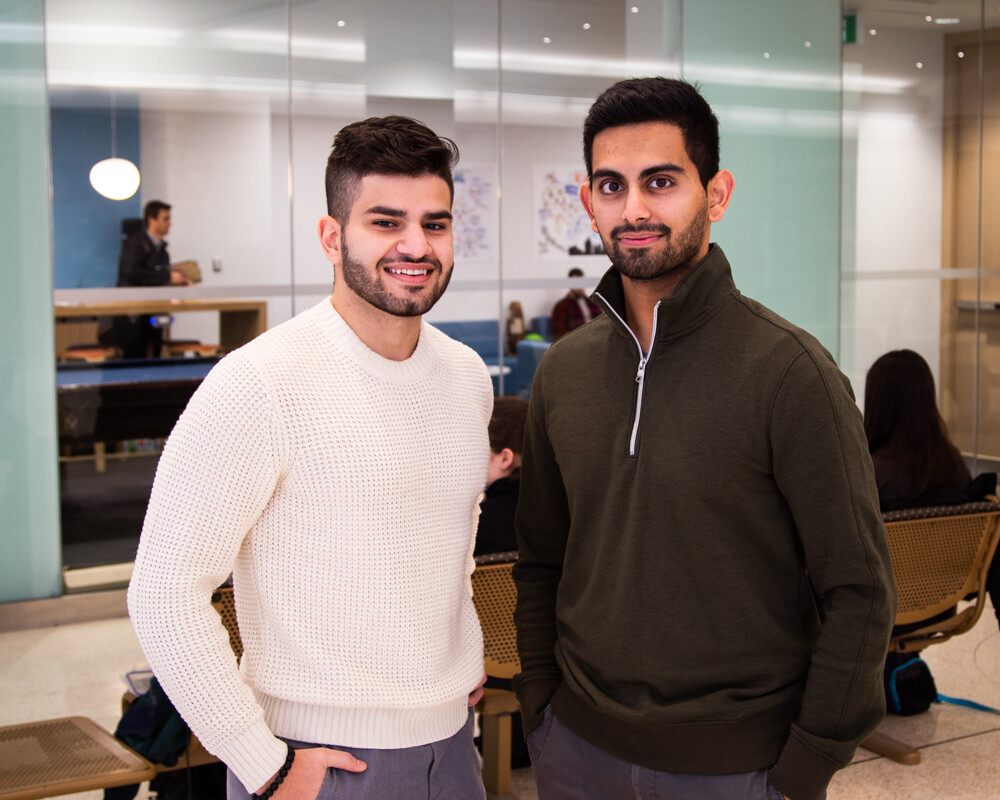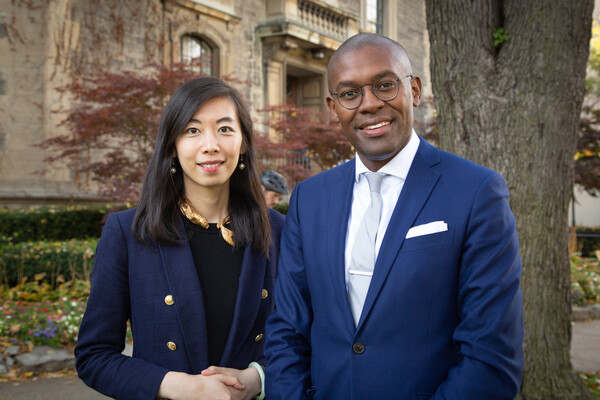Breadcrumbs
- Home
- MD/PhD Program
- News
- Faces of U of T Medicine: Yesh Rai and Arshia Javidan
Faces of U of T Medicine: Yesh Rai and Arshia Javidan

 As medical students, Yesh Rai and Arshia Javidan know a few things about evaluations. So, in their roles as the student accreditation leads, they’re helping with an evaluation of the MD Program. The two will drive the Independent Student Analysis (ISA), a key part of the accreditation process. Accreditation takes place every eight years at medical schools across Canada, reflects the quality of their programs, and is required to provide medical degrees. Rai and Javidan, who are both in their second year of the MD Program, recently spoke with writer Erin Howe about their roles and the value of the ISA.
As medical students, Yesh Rai and Arshia Javidan know a few things about evaluations. So, in their roles as the student accreditation leads, they’re helping with an evaluation of the MD Program. The two will drive the Independent Student Analysis (ISA), a key part of the accreditation process. Accreditation takes place every eight years at medical schools across Canada, reflects the quality of their programs, and is required to provide medical degrees. Rai and Javidan, who are both in their second year of the MD Program, recently spoke with writer Erin Howe about their roles and the value of the ISA.
As the ISA Leads, what types of work do you do?
Rai: Our main role is to gather student feedback on all aspects of medical school via the ISA, use that information to create a comprehensive report to support accreditation and improvements to the MD Program. We work with a team of students from each year of the MD Program to help give us a thorough understanding of year-, campus- and MD/PhD-specific concerns. We also work with Chris Jones, the MD Program’s Accreditation Officer, and liaise with MD Program leadership and the Medical Society.
After we have all the data, we’ll compile a report, which will be publicly available online. It will include strengths, weaknesses and recommendations for the MD program. Within a few months, faculty will respond to the areas we’ve highlighted in the report.
What’s the impact of the ISA?
Javidan: It’s a way to evaluate how well U of T Med upholds the accreditation standards set by the Committee on Accreditation of Canadian Medical Schools (CACMS). The ISA looks at these standards through the student lens using a set of standardized questions from CACMS.
The ISA is also an opportunity to improve the quality of medical education at U of T through supplemental questions that reflect specific student concerns. We’ve established a process to ensure if there’s a topic important to you, it’ll most likely be captured in the ISA. This includes things like call room availability in clerkship, the culture of mental health in medical school and how well-prepared students feel for clerkship. That’s just the tip of the iceberg — the ISA is all-encompassing. By identifying areas of improvement, we can bring the faculty’s attention to it and advocate for change.
The last ISA in 2011 led to a lot of improvements students asked for, like greater financial supports, strengthening of certain clerkship rotations (especially surgery) and increased objectivity in clinical evaluations. This ISA will be also be an opportunity to examine student perceptions of the new Foundations curriculum and concerns specific to Mississauga Academy of Medicine students.
What do you want your classmates to know about the ISA?
Javidan: The ISA isn’t just a way to identify areas opportunities for improvement; it’s also a way to celebrate our strengths and highlight the need to sustain them.
We’re thankful for the team we work with, which includes class leads from each year as well as MD/PhD leads. Each set of year leads works with a student task force of 3 to 10 people. Together, they identify areas we should tailor questions to — we’re trying to be as thorough as possible to capture the maximum breadth of student opinion. The ISA is an independent process, so the student team has the final say on how the survey looks.
We’re working with experts from The Wilson Centre to validate our survey. Once it’s ready to go, we’ll work around each year’s schedule to set aside time for students to complete the survey.
We want to achieve the highest response rate possible to make sure the opinions we capture truly represent U of T Med.
Why did you want to be involved in the accreditation process in such a hands-on way?
Rai: I’ve had long-standing interest and involvement in medical education (MedEd) and quality improvement (QI) projects. Accreditation and the ISA are an intersection of the two. It’s a great opportunity to understand the intricacies of the MD Program at U of T, make connections and contribute to the student experience.
Javidan: Medical education at U of T is world-class. One reason is its commitment to improvement. I wanted to be involved with this process and advocate for my peers and future generations of students. Like Yesh, I’ve been interested in MedEd and QI for some time. I’m also working toward a Master’s degree in System Leadership & Innovation and this seemed like the perfect way to engage my interests while advocating for the student body.
It’s still early in the process, but is there anything you’ve learned or been surprised by as you’ve been part of this work?
Javidan: When we started work with the ISA, we initially felt overwhelmed. But focusing on the final vision helped us refine our process and chart the path there. Reaching out to previous ISA leads at other schools also helped us break down overwhelming boulders of tasks into more manageable pebbles.
The other thing I’ve been pleasantly surprised by is how smoothly the process is going. Faculty have been supportive in sorting out the administrative and financial details. We also can’t give enough praise to the student team that we work with. I think these experiences are a testament to the culture of academic support at U of T Medicine.
Finally, we’re open to any questions, comments, or concerns about the ISA. Please feel free to contact us at arshia.javidan@mail.utoronto.ca and yesh.rai@mail.utoronto.ca.
For more information about accreditation, visit uoft.me/medcred.
